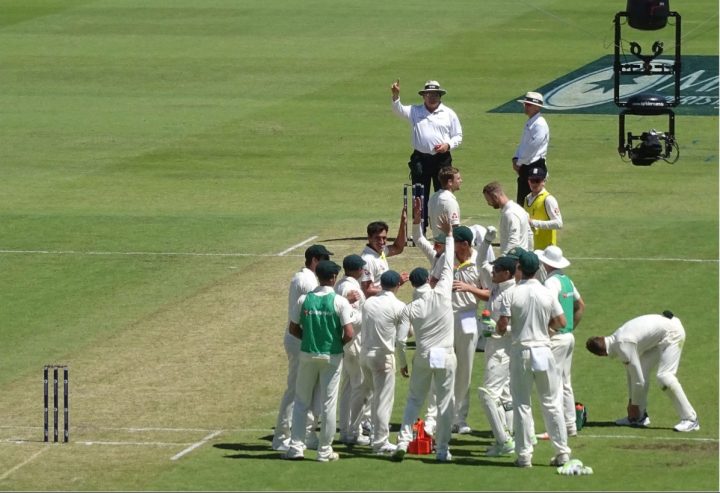First, an apology. This post is a little dated, as it relates to a piece which is now ten days old, and many of you will already have read and discussed it elsewhere. You may also have seen an excellent fisk of this material on another blog of similar mien.
Alas, resources of time prevented me from addressing this before. But better late than never. If I’ve tried to do anything on this site during the last year, it’s to hold Paul Downton to account, analyse what he says, and apply scrutiny. I find it uncomfortable to let his public pronouncements pass by unremarked.
The piece in question is an interview between Downton, the managing director of the England cricket teams, and Paul Hayward, the chief sports writer of the Daily Telegraph, on 3rd February.
The problem with a newspaper interview is you don’t really know which questions were asked but unanswered. Stonewalling – easier for the interviewee in a non-broadcast environment – is dull and annoying when written up. Hayward’s job is to entertain a general readership, not appease nit-picking bloggers.
That said, the interview still feels like a lost opportunity, especially as Hayward is one of the few mainstream hacks who knows the ECB aren’t telling the truth, and has repeatedly said so. He ultimately allowed Downton to wriggle off the hook, without calling him out on the gaping flaws in his case.
Let’s spool through the copy.
For Gary Ballance to be voted emerging Test player of the year was sensational. Root has recovered and scored six centuries: three in Tests and three in one-dayers. In the background was the turmoil that was going on in the media about Alastair and Kevin. To my mind, what was going on on the cricket side was being missed: the turnaround against India, after we went 1-0 down. That was huge testament to that group of players, the coaches that had come in, to Alastair, the environment they created, the way young players were thriving.
Yes, Ballance and Root both performed very strongly during the 2015 summer. But that’s not really Downton’s main point. What he’s trying to say is ‘nothing to see here, please move along’. The Pietersen/Cook sagas – the sacking of a very senior player for no reason, the propping up of a bankrupt captain – were both irrelevant, Downton says, compared to the real story. This was the “thriving” of the young players, whose successes he exaggerates. He spun a similar line during his BBC interview with Simon Mann in December.
Downton is also attempting to make a subtler point. He attributes the impact of the new generation not to their personal efforts, nor to good fortune. No, it was “testament” to the coaches, to Alastair Cook, and to their fabled “environment”. In other words, the Downton regime. The recovery against India was vindication of his brave new world. By extension, it wouldn’t have happened with Pietersen still in the dressing room.
Hayward then steered the conversation towards Alastair Cook.
His Test success has been frozen in time.
I have no idea what this means. Cook’s test accomplishments have been wrongly forgotten about? Or they were so long ago as to be almost Pleistocene?
We had a difficult summer, which we got through really on the up at the end – won three Tests in a row. The sense of achievement at that stage was huge – from [Cook’s] point of view, and the young guys coming in.
England beat a limp and porous India 3-1. By the end of the series, wasn’t Cook’s overriding sense one of relief, not huge achievement?
I think his credentials in one-day cricket are less obvious than in Test cricket.
Talk about an understatement.
But moving on, why was Cook retained as ODI captain for December’s Sri Lanka tour?
The thinking at the time was: ‘You’ve just created this winning environment, you deserve the right to go on’.
Was the test series win over India directly attributable to Cook’s miraculous dressing room alchemy? And nothing to do with Ballance’s runs or James Anderson’s improved form? If results are tied to the environment created by the captain, what does that say about the 2013/14 Ashes?
It’s a bit of a push, too, to suggest Cook concocted a victory-culture in ODI cricket, which in this context was what mattered. Under his command in the two preceding one-day series, England lost 3-2 to Sri Lanka and 3-1 to India, both at home.
Bear in mind he was appointed after the last World Cup with this World Cup in mind, so we didn’t want to give that away.
Not for the first time, an inversion of the correct principles. English cricket revolves around what’s best for Alastair Cook, not the reverse. The captaincy was his plaything, his trinket, his birthright.
In the end, the pressure was on him for the whole year, when he became the lightning rod for a lot of criticism, some of it fair, a lot of it unfair.
And whose fault was that?
Then it was clear we had just reached a tipping point, when he wasn’t going to be able to perform and the pressure was just immense. It maybe got to the stage where it was impacting the side.
Really? Who knew?
We had several chats.
Interesting, isn’t it, that some captains, during times of crisis, are extensively consulted and counselled by management. Others are sacked over the phone without right of reply.
The opportunity we have is to reintroduce Alastair now. He’s an asset to English cricket. My view is that he will continue to captain the Test side. There’s a huge amount to look forward to: 17 Tests in 10 months, with an Ashes series and South Africa. He deserves the opportunity to get back to doing what he does best, which is scoring Test runs.
I’m not pretending that this won’t have damaged him. He’ll be incredibly hurt. But he’s incredibly strong-minded and I hope he would come back rejuvenated [and] utterly determined
Is this an admission, in effect, that Cook’s test form has been inadequate for too long? And a concession, too, that he was jaded, even burned out, by an insufferable workload? If Cook will return “rejuvenated’, in what state would he have been if he’d played in the World Cup after all, which was the selectors’ original intention?
Hayward then asked Downton about his tumultuous first few months in the job.
I was due to start on Feb 1 [last year] but in fact I went to Australia on New Year’s Eve [2013] and really met Andy [Flower, the head coach] for the first time that day.
The prominence of this reference to Flower is revealing. In assessing the lie of the land, Downton immediately gravitated towards the coach, and the coach’s agenda. From this point onwards, Downton was at the mercy of Flower’s tractor beam.
From that point, six centrally contracted players were out of the side. Swann had gone home, Trott had gone home, Prior was dropped, Root was dropped, Bresnan was out and Finn was out. Six of our 11 weren’t playing. We’d still not replaced Strauss, 18 months on. Carberry had had a decent series but hadn’t nailed it down. We had an issue to deal with in Kevin.
Which was…er, what, exactly? Care to explain?
From that low point, taking the decision that Kevin and ourselves would part company, and then moving on, what we’ve done has surpassed our expectations.
This is classic Downtonian fraudulence. On the basis of no evidence whatsoever, he credits England’s (limited) successes in 2014 to the sacking of Pietersen. And have the team’s performances since then really “surpassed” expectations? England lost to Sri Lanka is all three formats – the test and ODI series, and the T20. They beat India in the tests and T20 but lost the ODIs. How low, exactly, were their expectations?
There’s a group of players now who’ve almost grown up together, from Woakes, Taylor, Buttler, Root, Stokes. We’ve got a real core of people who can potentially come together.
Taylor is not in the test side. Stokes has been dropped in every format. Woakes’s test place is far from guaranteed. The selectors resisted Buttler until they had no other option. How much time, precisely. have those five cricketers spent in each other’s company?
And now to Pietersen.
I’m not going to go into the detail. What I’ve said in the past is that I arrived in Sydney and saw someone who was clearly quite disconnected from the team. You can tell, just watching,” Downton says. “And, of course, that’s subsequently been proven by what he’s written…what I said at the time was that he found himself disconnected.
Downton won’t go into detail because he doesn’t have any – at least none which helps his case. The questions overwhelming begged here are: what ‘disconnected’ means, which examples Downton could cite to illustrate, how that disconnection affected the team, whether anyone else was also responsible for it, and whether it could have been repaired by means other than sacking him.
He seems to argue that Pietersen’s ‘disconnection’ was obvious from watching him field in the deep for one test match. If you “can tell, just watching”, why didn’t everyone else come to the same conclusion?
All you need to do is read Kevin’s book to understand why that decision had to be made.
Downton plays the book as his trump card. It’s an egregious and insulting strategy, to rationalise after the event on grounds non-existent at the time of the decision. Is he trying to say he fired Pietersen on the basis of a book not only written nine months later, but was only written in response to the sacking? And what would he have said to bolster his cause if the book had not been published?
One other point. If Downton attaches so much weight to the book and its contents, does this mean he also accepts Pietersen’s manifold criticisms of ECB conduct?
It became a unanimous decision from senior players in the dressing room, captain, all the coaching staff, through the management to the board that actually now is the right time to part company.
This isn’t true, and doesn’t even tally with what Downton has himself said previously. According to his TMS interview on 22nd May last year, it was only “quite a few” of the senior players who agreed with the decision to jettision Pietersen, which is rather different from unanimity. And if you click that link, you’ll see that then-ODI coach Ashley Giles, and probably David Saker too, still supported Pietersen.
We settled with Kevin. Kevin wanted to get his future sorted out before the IPL as well. So, we settled.
In what way is firing someone ‘settling’ with them? Does Pietersen – who still wants to return to the side – regard the matter as settled? With breathtaking disingenuity, Downton claims that a financial settlement of the contract amounted to an equitable resolution of the situation.
Am I confident it was right for English cricket? Absolutely. I think young players have flourished and thrived.
In the absence of any suggestion the younger England players felt unstabilised by Pietersen, and in the presence of much testimony they benefited from his counsel, why wouldn’t those cricketers have flourished if Pietersen had remained? Again, Downton is using an irrelevant factor, which happened after the event, as an excuse. It’s also tenuous to suggest the youngsters have collectively thrived. Sam Robson has struggled. Moeen Ali’s test batting has been patchy. Stokes was dropped. Woakes has not yet made a convincing case.
It’s very good to see Kevin enjoying his cricket again [at the Big Bash]. Seeing him wearing a head cam or mic’d up to the commentary box – he’s thrived in that kind of atmosphere. He loves it.
Oh, for goodness sake.
Next up was Peter Moores.
I just think it was his time. To me, Peter was the outstanding coach in England. What I felt we needed was someone with substance and confidence to take on what was going to be a difficult start. It’s always exciting to be part of a rebuilding.
And who failed to feel a shiver of raw excitement down their spine when Moores was unveiled as the new Team Director? If now was ‘his time’, what was his first period in charge? Or was it a case of repeatedly appointing him in the hope that he’d eventually be good enough? Whether Moores – who’s overseen relegations and never prospered in county one-day cricket – was indeed the ‘outstanding’ coach remains open to question. Was he more outstanding than Jason Gillespie, who now says he wouldn’t rule out the job of England coach.
In the interview, Downton also offered extensive praise – mostly justified – for Joe Root. But I’ll quote one final line, his piece de resistance.
Of the World Cup, Downton says: “I think people will look at us now and say we’re a bit of a side to be reckoned with.”
Sometimes, this stuff just writes itself.










can we please fire him and sue him for damages?? If this is the state of ‘management’ in the modern world then tbh we are screwed.
On Joe Root, Root has been pushed as the next England captain by almost all the press corps so it was curious when Jos Buttler was made v/c for the WC. George Dobell wrote an interesting piece on it:
http://www.espncricinfo.com/thestands/content/story/828437.html
“Downton speaks”. ZZZZzzzzzzzzzzzzzzzzzz
He just makes it up as he goes along.
Test – please ignore
… yes that sums up the interview just perfectly!
I’m not sure whether to call him a condescending @rse, or a hapless halfwit.
Either seems appropriate.
Paul Downton is quite disgraceful. He is an incompetent in a position of power and arrogant with it.
And comes under far too little scrutiny from men who played domestic and/or Test cricket alongside or against him.
I think we should be grateful for Hayward and Mann, because the alternatives include, inter alia:
http://www1.skysports.com/cricket/news/12172/9346590/paul-downton-ecb-managing-director-talks-about-his-new-role-and-remits
http://www.telegraph.co.uk/sport/cricket/international/england/10389961/England-have-picked-a-diamond-in-decent-dignified-and-debonair-Paul-Downton-as-managing-director.html
http://www.theguardian.com/sport/blog/2014/may/01/graham-gooch-exit-england-coaching-overhaul
With the last, you may have to read carefully to spot the key sentence. So here it is:
“The recruitment of Paul Downton as Morris’s replacement was an excellent move”
Three weeks later he broke the non-disclosure agreement and disappeared from view for another seven months.
Apparently the OED are re-defining the word “aplomb”.
https://twitter.com/stephenbrenkley/status/457456403985465344
I know Arron. We come here or visit “Being Outside Cricket” because cricket ‘journalists’ like Pringle, Selvey, Agnew, Hughes, Newman, Brenkley and others shield Downton and the ECB with lies and half-truths.
It is infuriating and disgusting, and I have never experienced such a thing in cricket in my 66 years.
I feel sick!!!
For once I am with you Julie.
Don’t like saying things like this but – based on his interviews and public proclamations – I hate the plonker.
The only thing that turns my milk to yogurt faster is the thought that Moores will soon be ‘settled’ with and we’ll get Flower back around for another stint.
Compensation and non-jobs all ’round!
Masterfful!! In a nutshell, embodies everything wring with the ECB!!
It’s people like him that makes me want England to struggle for the foreseeable future. I am proud to be British but sometimes for the bigger picture short term suffering is a good thing.
It makes me sick that I want my home nation to lose but it needs to happen to make clowns like him and his position untenable. In the end he will be all but forgotten shortly, the likes of KP will go down as an England great however hard the likes of ECB and Lord Selvey rub him out of history.
On a separate note, this is an absolutely fantastic read and one that I truely have to agree with.
http://www.theguardian.com/sport/blog/2015/feb/13/channel-nine-destroying-cricket-legacy?CMP=share_btn_tw
A disgrace that England’s management can’t manage one of the best batsmen in the world today who should be playing FOR ENGLAND. Evidence? Look at the shameful batting we had to endure today at the MCG, and you’ll get another hiding from New Zealand in a few days time because the players selected ARE NOT seasoned enough and that is because management have screwed up. If you can’t manage look for another job. Maybe managing fruit and veg down the local market.
Downton’s in charge of every England team ain’t he? Noticed how the women’s sides results have stuttered since he took charge? From winning a test in Australia to losing one at home to India and hammered twice in a week in NZ.